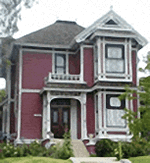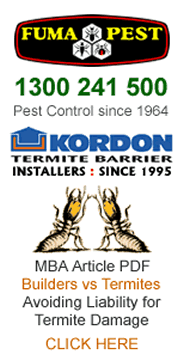| |
Home Builders.net.au • Termites white-ants in Maitland Hunter Valley Region
|
|
| |
 |
|
Home Builders when building a new home or ground level extensions must include a termite barrier in accordance with Building Code & Maitland Council requirements.
In addition, home builders often find active termites during renovations when walls are remodelled or demolished.
Glenn DuBois of FUMAPEST Termite Control Maitland • article on destructive termites in the Maitland Hunter Valley region - their identification - destructive nature - usual nest location sites.
Glenn DuBois is Technical Director at FUMAPEST • Secretary of Australian Pest Control Association • Master of Commerce UNSW • TAFE Urban Pest Control Certificate • served on the NSW Govt Pest Licensing Board & Standards Australia Termite Control Committees AS.3660 & AS.4349. |
FUMAPEST Termite Control Maitland has NSW Licence to install KORDON Termite Barrier in buildings during construction and advise builders and their clientele on what is required to properly protect the building from termites. |
|
Destructive Termites • white-ants • in the Maitland Hunter Valley Region
|
Subterranean termites or "white-ants" are a fascinating yet highly destructive timber pest, causing major structural timber damage to domestic and commercial buildings in the Maitland Hunter Valley Region.
Termites are a serious economic pest in the Maitland Council Region: We estimate about one quarter of all properties in the area will be seriously affected by subterranean termites. That's why virtually all sales of homes in the Maitland Hunter Valley Region are subject to a Timber Pest Inspection Report to AS.4349 as part of the Contract of Sale.
Most homes are at high risk in the Maitland Hunter Valley Region - particularly the medium to high density areas where well established gum trees are within a 100 metre radius of the building.
The wide use of landscaping timbers and garden mulch also dramatically increases the risk. Many of the older style homes, built low to the ground, with poor ventilation, are ripe for subterranean termite attack and should be protected by Termite Preventive Barrier to AS.3660 using Termidor soil treatment termiticide.
|
| PROPER IDENTIFICATION IS ESSENTIAL • Some species of subterranean termites prefer to attack living trees and will not eat dry seasoned timbers in a building, whilst others can be are highly destructive to such buildings in a short amount of time. |
Coptotermes acinaciformis - common in Maitland Hunter Valley Region particularly in built-up urban areas - under concrete on-ground flooring - areas where eucalypt gum trees are prevalent.
Highly Destructive - most widely distributed and destructive timber pest in the region - accounts for more than 70% of damage to buildings - a single colony may contain more than 1 million termites.
Nest Location - Coptotermes acinaciformis - very secretive termite species - build their nest out of sight, often within the base of eucalyptus or other susceptible trees, or completely under the ground - often within an enclosed patio or under concrete on ground flooring which is ideal for moisture retention, temperature and humidity control within the termite colony's central nest. |
Schedorhinotermes intermedius - often found in Maitland Hunter Valley Region - they appear to gouge affected timber - soldiers contain a larger major 6mm length - minor soldier 4mm length.
Destructive Nature - Schedorhinotermes intermedius are highly destructive to buildings and other timber structures. If mostly major (larger) soldiers are sighted, it is most likely a large colony with the potential to cause severe and rapid damage to structural timbers of a building and timber structures.
Nest Location - Schedorhinotermes intermedius commonly build their nest in tree stumps, in the root crown of living, dead or debilitated trees, under houses or within enclosed patios or other areas where timber is buried or stored in contact with the soil. |
Coptotermes frenchi - are found in the Maitland Hunter Valley Region - particularly in built-up urban areas, where homes and buildings are constructed of softwood or oregon timber framing.
Highly Destructive - causing severe damage to buildings and other wooden structures - often devouring timber framing leaving behind only a hollowed out thin veneer.
Nest Location - Identification - they often build their nest in root crown or lower trunk area of living trees, particularly eucalypts - may build their nest as a mound in dryer areas - Coptotermes frenchi is an extremely shy termite - they will retreat from a location immediately, if disturbed.- the soldiers have a pear shaped head compared to a somewhat rectangular head of Coptotermes acinaciformis. |
Nasutitermes exitiosus are commonly found in the Maitland Hunter Valley Region and other areas of NSW - particularly in built-up urban areas or where eucalypt gum trees are highly prevalent.
Destructive Nature - Nasutitermes exitiosus are destructive to buildings and other timber structures. Sometimes severe damage may occur, but not so commonly as the other species listed above.
Nest Location - Nasutitermes exitiosus build a mound nest which protrudes 30cm to 75cm above ground. The observed nest can be treated with Termidor Termiticide for total colony elimination. |
Coptotermes lacteus are found in the Maitland Hunter Valley Region and accross eastern NSW - particularly prevalent along the entire coast-line, along the Great Dividing Range and western slopes.
Destructive Nature - Coptotermes lacteus attacks stumps, dead trees, timber fences, poles and other timber structures that are in contact with the soil, being softened by weathering or decay. These termites are also known to attack such timber in damp sub-floor areas.
Nest Location - this termite species, most often builds it's nest as a mound up to 2m above ground level, with hard clay walls - to eradicate the colony - treat with Termidor Termiticide. |
Nasutitermes walkeri are commonly found in the Maitland Hunter Valley Region and other coastal and mountain regions along the eastern side of NSW.
Nasutitermes walkeri can be destructive to damp timbers often a serious problem where the sub-floor of a building is damp and ventilation is poor with resulting wood decay or fungal growth.
Nest Location - Nasutitermes walkeri build a nest in trees on the main trunk or in fork of large branch. |
Heterotermes ferox are commonly found in the Maitland Hunter Valley Region particularly where eucalypt gum trees and damp decaying timber are highly prevalent.
Prefers Damp Decaying Timbers - usually encountered attacking posts, poles, paling fences, timber decking and flooring - wherever weathering and decay are present - sometimes may cause severe damage to sound timbers - often confused with the more destructive Coptotermes acinaciformis.
Nest Location & Identification - a multi-nester - small subterranean nests - near stumps, rotting wood or nests of other species - do not range far from nest - do not have extensive gallery systems - leave affected timber with mottled appearance - soldiers 3.5 to 7.5mm - with a long rectangular head - no obvious teeth on dark mandibles - display a peculiar shuffle backwards when confronted. |
Dampwood Termites form small independent nests which often attack sick or dead trees, decaying stumps or mould timber in the ground; they are seldom found in dry timbers in buildings. |
Drywood Termites occur mostly in tropical areas, where atmospheric humidity is constantly above 75 percent. The introduced and highly destructive West Indian drywood termite, Cryptotermes brevis, is rarely located in NSW, once in Sydney in the early 1980's. Specialist eradication procedures involve wrapping entire building in plastic and using methyl bromide fumigation. |
|
Termites & Termite Control Services • Articles • PDF Links
|
|
KORDON Termite Barrier • Articles • Links
|
| WARNING: The NSW WorkCover Pest Control Licensing is INADEQUATE |
Be Careful in selecting a Pest Controller • Unfortunately, it is far too easy to get a NSW Government WorkCover issued pest control licence and start up a Pest Control business in NSW with little knowledge or experience in providing safe and effective pest control services • click here for more details.
The NSW Pest Control Licensing system is subject to National Competency Assessment guidelines. Mediocre testing can be carried by Private Workplace Assessors (not part of TAFE system). The so called competency assessment can be a combination of oral, written and visual tests ie maybe 1% in writing.
Private Workplace Assessors are given general guidelines in the National Competency Standards but there is no set standard test or specific knowledge requirements. Once privately assessed as "competent" then the NSW WorkCover Pest Control Licensing will issue a pest control licence to the individual. There is no published list of Private Workplace Assessors so it is difficult to gauge the extent of the problem.
The System is Inadequate: Some Private Assessors offer a one week course. A person so issued with a pest control licence can set up a Pest Control business (not required to register with WorkCover) and employ an unlimited number of trainees, using pesticides in people's homes without direct personal supervision.
FUMAPEST Setting the Standard in an industry plagued by fly-by-night operators, FUMAPEST Termite & Pest Control stands out as a reputable pest control business with excellent reputation in the market-place.
Same Family Business • Since 1964 • Termite & Pest Control Specialists • AQIS Fumigation Services |
|
| FUMAPEST Termite & Pest Control services the Maitland Council Region |
|
|
|
